Publications
In association with the Ulster Historical Foundation.
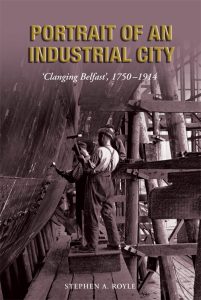
Portrait of an Industrial City: “Clanging Belfast” 1750-1914 by Stephen A. Royle, 2011
‘Hammers clanging’ was the sound that the great nineteenth-century novelist William Makepeace Thackeray associated with Belfast when he visited it in 1842. Belfast ‘s industrial development was already well under way. Had Thackeray visited the city in 1900, he would not have been surprised to find that it was by then the fastest-growing city in the British Isles. It had outstripped Dublin as the largest on the island of Ireland, indeed it ranked third in the British Empire….and still echoed to the sound of those clanging hammers.
Industry lay at the heart of the city’s manufacturing prowess. The shipyards dominated the central harbour area. The textile mills – over 200 of them – seemed to be on very street corner. The constant movement of workers and goods, the smells and sounds of constant industrial activity, and that distinctive clang of metal on metal, dominated the city’s daily life.
Throughout the book, the deft use of primary sources and documents illuminates the intriguing story of Belfast, an industrial city described in 1915 at the end of the book’s period of interest ,as ‘really a wonder’. Published before the end of December 2011.
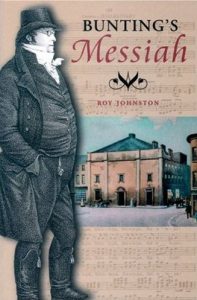
Bunting’s Messiah by Roy Johnston, 2003
There was no greater representative of the intense interest in Irish culture in Belfast in the decade before the 1798 Rebellion than Edward Bunting. Born in 1773 in Armagh, he showed early musical talent. He moved to Belfast via Drogheda at the age of 11 as apprentice to William Ware, the first organist of St Anne’s parish church. His interest was captured by the famous 1792 Belfast Harp festival, at which he transcribed the airs. His fame rests on his three pioneering volumes of what he called the “ancient music of Ireland,” collected during tours of the countryside where the traditional music was kept alive by singers, pipers and fiddlers, as well as harpers. Less well known is his career as organist, piano soloist, and promoter of concerts. His musical energies culminated in Belfast with the four-day sacred-and-secular music festival which he organised in 1813, at which the first near-complete performance of Handel’s Messiah was given. This is a long-overdue account of Bunting’s considerable contribution to the musical life of the Belfast of his day, reconstructed from existing sources and new research into contemporary documents.
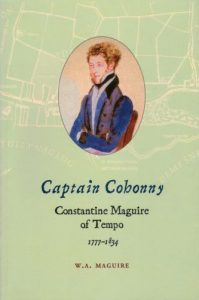
Captain Cohonny: Constantine Maguire of Tempo, 1777-1834 by W.A. Maguire, 2002
The Maguires of Tempo, whose substantial estate dated from the Ulster Plantation in 1610, were the only gaelic family in Fermanagh to survive the upheavals of the next two centuries with their property more or less intact. By the time Constantine Maguire – the subject of this book – inherited in 1800, however, only a fraction remained.
The extraordinary story of this resourceful, not to say ruthless, man’s struggle to retain his social standing – in the course of which he married a famous courtesan and then fell in love with a mistress of his own (who lived with him for the seven years he chose to stay in the debtors’ prison in Dublin) – reads like a novel of the period. His brutal murder in Tipperary in 1834 was a suitably gothic finishing touch to a rackety career. At a more serious level, the tale of Captain Cohonny’ throws useful light on some obscure aspects of life and death in early nineteenth century Ireland.
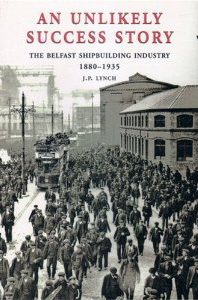
An Unlikely Success Story: the Belfast Shipbuilding Industry 1880-1935 by J.P. Lynch, 2001
This book offers the first history of the whole spectrum of the Belfast shipbuilding industry. It is the story of the yards and the ships. Beyond that it explores the social conditions and workplace environment of the tens of thousands whom this great industry embraced. John Lynch was born in 1955 and returned to education as a mature student at Ruskin College, Oxford in 1977. He came to Belfast in 1979 where he took a BA and a PhD at Queen’s. He now works in the Institute of Lifelong Learning teaching on the Part-time degree.
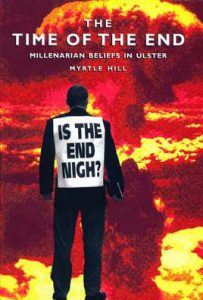
The Time of the End: Millenarian Beliefs in Ulster by Myrtle Hill, 2001
This work looks at the particular way in which Ulster society has been affected by millennial ideas. Though not exclusive to Protestant, that faith tied the end of the century to apocalyptic warnings and prophecies of the Second Coming. Myrtle Hill takes us through what is sometimes dismissed as a ‘lunatic fringe’ to reveal instead vibrant 18th and 19th century world views. Published before end of December 2000.
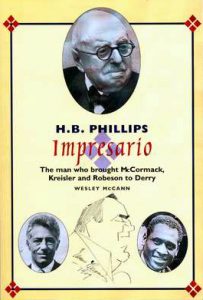
H.B. Phillips Impresario, the man who brought McCormack, Kreisler and Robeson to Derry by Wesley McCann, 2001
The violinist Fritz Kreisler and the singers John McCormack and Paul Robeson were without question among the most celebrated musicians of the early twentieth century, and each performed in Londonderry within a few months of one another in 1935 and 1936. This was due largely to the efforts of a remarkable man, Henry Bettesworth Phillips, who in a sixty-year career as an impresario and owner of the world-renowned Carl Rosa Opera Company brought pleasure to audiences throughout the length and breadth of the country. Drawing on the surviving correspondence and contemporary reports Wesley McCann traces Phillips’s varied career and unravels the many twists and turns of the planning which went into the brilliant series of concerts in Derry’s Guildhall.
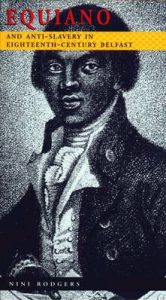
Equiano and anti-slavery in eighteenth century Belfast by Nini Rodgers, 2000
The celebrated freed slave, Olaudah Equiano, visited Ireland in 1791-2 and was welcomed ‘particularly in Belfast’. Long-standing radical rhetoric about the political slavery of Ireland was now, and in the context of the ‘Rights of Man’ applied specifically to oppressed peoples, whether black or Catholic. And yet Belfast’s commercial and industrial advance, a major trigger of radical self-assertion, was intimately linked to trade and connections with the slave economies of the West Indies.
Nini Rodgers with her wide ranging interest in the history of slavery and its role in the Atlantic economy, is well equipped to move beyond the ‘black and white’ simplicities of a purely parochial portrayal of Belfast’s role in slavery issues. Published before end of December 2000.
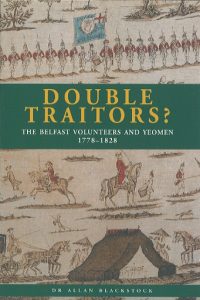
Double Traitors? The Belfast Volunteers and Yeomen 1778-1828 by Allan Blackstock, 2000
In the 1790’s a crucial battle for the mantle of the original Irish Volunteer movement of 1778-1784 was waged between the government and the United Irishmen. This was to decide which would be the dominant political and military force in Ulster. In Belfast the struggle was at its sharpest as the radicals held the initiative at first. When the yeomanry were formed in 1796-7 the United Irishmen had to decide whether to seek to take over that body of men, or to turn out independently in rebellion. Published before end of December 2000.
Allan Blackstock as the major historian of the yeomanry, is particularly well equipped to chart the uncertainties of this critical contest, the outcome of which helped determine the fate of the United Irish rebellion in 1798. Published before end of December 2000.